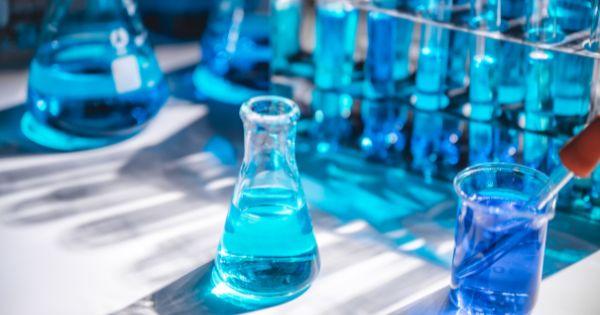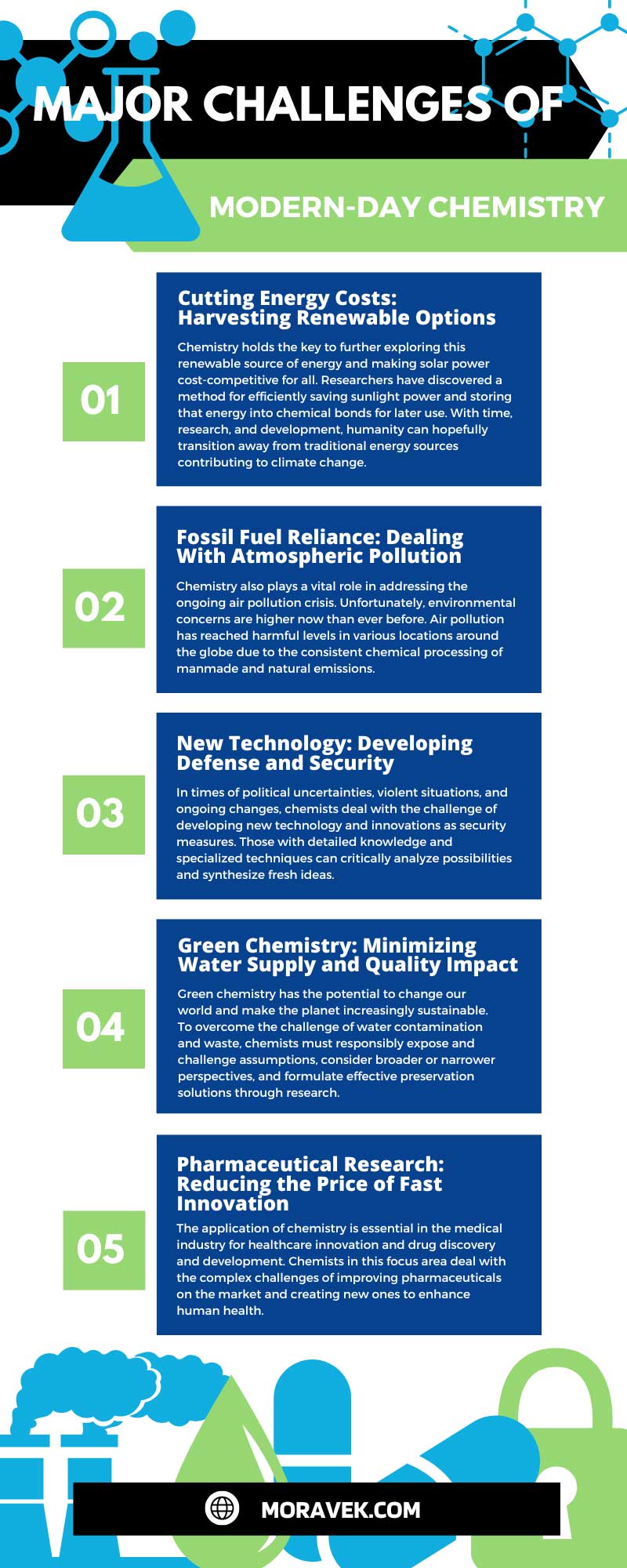
As Albert Einstein recognized, “The formulation of a problem is often more essential than its solution, which may be merely a matter of mathematical or experimental skill.” At the core, chemistry is about more than discovery—the science and art of matter involve both creation and destruction. Chemistry is a scientific study that plays a pivotal role in our understanding of synthetic and physical phenomena and, as follows, both the material and natural world.
Throughout history, chemists have come together to work with other skilled experts in their fields for a single reason: to solve grand challenges in society. Thanks to these combined scientific and technological efforts, some of the most profound questions have been answered. Not to mention that some of the greatest goals—like space travel—have been achieved.
But what about today’s biggest chemistry problems? What is the current generation of expert chemists working toward? Formulating and recognizing these challenges is essential to discovering solutions that improve human welfare. Here are the ten major challenges of modern-day chemistry to consider, as well as information outlining how these scientific opportunities can create future remedies.
Cutting Energy Costs: Harvesting Renewable Options
Solving energy problems in our current infrastructure is one of the main challenges of modern-day chemistry. As an endless source of power, the sun has the potential to resolve the issue of rising energy costs in society and aid in the progress of sustainability efforts.
Chemistry holds the key to further exploring this renewable source of energy and making solar power cost-competitive for all. Researchers have discovered a method for efficiently saving sunlight power and storing that energy into chemical bonds for later use. With time, research, and development, humanity can hopefully transition away from traditional energy sources contributing to climate change.
Fossil Fuel Reliance: Dealing With Atmospheric Pollution
Chemistry also plays a vital role in addressing the ongoing air pollution crisis. Unfortunately, environmental concerns are higher now than ever before. Air pollution has reached harmful levels in various locations around the globe due to the consistent chemical processing of manmade and natural emissions.
Because of this gradual and rapid development, poor air quality continues to wreak havoc on the environment and accelerate global warming. Mitigation strategies must understand and address adverse pollution to prevent further extensive consequences. Only scientific-based solutions can help identify top pollution sources, design effective control strategies, and develop new technologies that reduce the current problem.
New Technology: Developing Defense and Security
In times of political uncertainties, violent situations, and ongoing changes, chemists deal with the challenge of developing new technology and innovations as security measures. Those with detailed knowledge and specialized techniques can critically analyze possibilities and synthesize fresh ideas.
History has proven the powerful capabilities of chemical products. Continuing to build and model newfound technologies can strengthen the field of national security and defense for the future.
Complex Specialties: Successfully Evolving Chemical Breakthroughs
World-class innovations and current research topics drive the development of new industries and scientific specialties forward. Systematically approaching these promising chemical breakthroughs is a crucial balancing act—and a persistent global challenge.
Scientific solutions must be beneficial to economic growth and sustainability without creating more complex problems for the health and safety of the environment—and the people living in it. Professionals must found research-driven advancements on improving human quality of life today and for future generations without wasting or destroying precious resources.
Green Chemistry: Minimizing Water Supply and Quality Impact
Green chemistry has the potential to change our world and make the planet increasingly sustainable. To overcome the challenge of water contamination and waste, chemists must responsibly expose and challenge assumptions, consider broader or narrower perspectives, and formulate effective preservation solutions through research.
Nutritional Demands: Meeting Growing and Aging Population Needs
This century holds a major challenge—and opportunity—for those in the scientific discipline that deals with nutrition. Securing the quality, safety, and nutritional value of foods is essential to meet the needs of a societal population that continues to grow and age. Enhancing molecular understanding through food chemistry will support healthy food production and ensure functionality and authenticity.
Reshaping Biology: Revealing and Understanding Genetics
There is respect for modern data-driven science and technology that advocates for human well-being. This is a place where the natural sciences of chemistry and biology meet. Chemistry studies the building blocks of matter, while biology studies living organisms and entities.
Chemical biologists tackle a variety of interdisciplinary challenges with knowledgeable tools and experience. One such challenge is the study of chemical changes within the human genome. Little is known now, but components of the genome can possibly reveal therapies for certain epigenetic markers or provide vital information on possible genetic risks of environmental pollutants.
Pharmaceutical Research: Reducing the Price of Fast Innovation
The application of chemistry is essential in the medical industry for healthcare innovation and drug discovery and development. Chemists in this focus area deal with the complex challenges of improving pharmaceuticals on the market and creating new ones to enhance human health.
However, reducing the costs of effective drug discovery and development is no simple feat. The challenge lies in the rising demand for fresh innovation and rapid evolution. The speedy metamorphosis of novel ideas comes with a steep cost to pharmaceutical companies and research organizations.
Disease Prevention and Treatment: Addressing Antimicrobial Resistance
The past development of antimicrobials is one of the most exceptional achievements of chemistry. However, these days, the problem of antimicrobial resistance has grown in scope and scale.
Chemists must continue to study and address this issue for health and economic prosperity to ensure the safety and efficacy of medical products. Preventing and treating diseases through chemical solutions involves the extensive challenge of trial and error.
Synthetic Chemistry: Identifying Viable Synthetic Routes
Synthetic chemistry requires specialized equipment and techniques to synthesize and analyze compounds. Designing a route to a complicated molecule structure is a challenging task, as chemists must complete the targeted process with precision for quality, quantity, and purity purposes.
The current traditional synthetic organic approach works well to deliver scientific breakthroughs for new molecular use, yet experts can potentially use advanced technological methods in the future that create or break chemical bonds with greater ease.
Custom Chemical Synthesis Solutions
Custom chemical synthesis requires working on tight deadlines to deliver quality products and services on time. The challenge of developing synthetic routes involves efficiently completing a determined number of reactions that achieve optimal results.
The expert chemist team at Moravek understands that how well we define a problem attests to how well we solve it. As one of the leading custom chemical synthesis companies, we provide custom synthesis of radiolabeled, stable-labeled, and non-labeled compounds to meet the needs of our clients. We strive to develop the most efficient synthetic routes to achieve specific study objectives. Contact our customer service department to learn more about our expert laboratory techniques and solutions.

